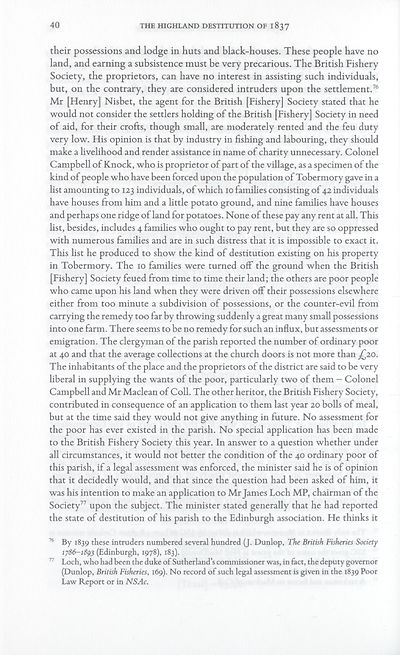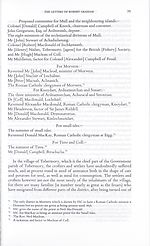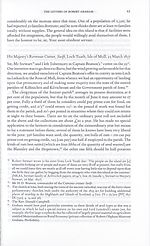Series 6 > Highland destitution of 1837
(117) Page 40
Download files
Complete book:
Individual page:
Thumbnail gallery: Grid view | List view

40
THE HIGHLAND DESTITUTION OF 183 7
their possessions and lodge in huts and black-houses. These people have no
land, and earning a subsistence must be very precarious. The British Fishery
Society, the proprietors, can have no interest in assisting such individuals,
but, on the contrary, they are considered intruders upon the settlement.76
Mr [Henry] Nisbet, the agent for the British [Fishery] Society stated that he
would not consider the settlers holding of the British [Fishery] Society in need
of aid, for their crofts, though small, are moderately rented and the feu duty
very low. His opinion is that by industry in fishing and labouring, they should
make a livelihood and render assistance in name of charity unnecessary. Colonel
Campbell of Knock, who is proprietor of part of the village, as a specimen of the
kind of people who have been forced upon the population of Tobermory gave in a
list amounting to 123 individuals, of which 10 families consisting of 42 individuals
have houses from him and a little potato ground, and nine families have houses
and perhaps one ridge of land for potatoes. None of these pay any rent at all. This
list, besides, includes 4 families who ought to pay rent, but they are so oppressed
with numerous families and are in such distress that it is impossible to exact it.
This list he produced to show the kind of destitution existing on his property
in Tobermory. The 10 families were turned off the ground when the British
[Fishery] Society feued from time to time their land; the others are poor people
who came upon his land when they were driven off their possessions elsewhere
either from too minute a subdivision of possessions, or the counter-evil from
carrying the remedy too far by throwing suddenly a great many small possessions
into one farm. There seems to be no remedy for such an influx, but assessments or
emigration. The clergyman of the parish reported the number of ordinary poor
at 40 and that the average collections at the church doors is not more than £20.
The inhabitants of the place and the proprietors of the district are said to be very
liberal in supplying the wants of the poor, particularly two of them - Colonel
Campbell and Mr Maclean of Coll. The other heritor, the British Fishery Society,
contributed in consequence of an application to them last year 20 bolls of meal,
but at the time said they would not give anything in future. No assessment for
the poor has ever existed in the parish. No special application has been made
to the British Fishery Society this year. In answer to a question whether under
all circumstances, it would not better the condition of the 40 ordinary poor of
this parish, if a legal assessment was enforced, the minister said he is of opinion
that it decidedly would, and that since the question had been asked of him, it
was his intention to make an application to Mr James Loch MP, chairman of the
Society77 upon the subject. The minister stated generally that he had reported
the state of destitution of his parish to the Edinburgh association. He thinks it
76 By 1839 these intruders numbered several hundred (J. Dunlop, The British Fisheries Society
1786-1893 (Edinburgh, 1978), 183).
77 Loch, who had been the duke of Sutherland’s commissioner was, in fact, the deputy governor
(Dunlop, British Fisheries, 169). No record of such legal assessment is given in the 1839 Poor
Law Report or in NSAc.
THE HIGHLAND DESTITUTION OF 183 7
their possessions and lodge in huts and black-houses. These people have no
land, and earning a subsistence must be very precarious. The British Fishery
Society, the proprietors, can have no interest in assisting such individuals,
but, on the contrary, they are considered intruders upon the settlement.76
Mr [Henry] Nisbet, the agent for the British [Fishery] Society stated that he
would not consider the settlers holding of the British [Fishery] Society in need
of aid, for their crofts, though small, are moderately rented and the feu duty
very low. His opinion is that by industry in fishing and labouring, they should
make a livelihood and render assistance in name of charity unnecessary. Colonel
Campbell of Knock, who is proprietor of part of the village, as a specimen of the
kind of people who have been forced upon the population of Tobermory gave in a
list amounting to 123 individuals, of which 10 families consisting of 42 individuals
have houses from him and a little potato ground, and nine families have houses
and perhaps one ridge of land for potatoes. None of these pay any rent at all. This
list, besides, includes 4 families who ought to pay rent, but they are so oppressed
with numerous families and are in such distress that it is impossible to exact it.
This list he produced to show the kind of destitution existing on his property
in Tobermory. The 10 families were turned off the ground when the British
[Fishery] Society feued from time to time their land; the others are poor people
who came upon his land when they were driven off their possessions elsewhere
either from too minute a subdivision of possessions, or the counter-evil from
carrying the remedy too far by throwing suddenly a great many small possessions
into one farm. There seems to be no remedy for such an influx, but assessments or
emigration. The clergyman of the parish reported the number of ordinary poor
at 40 and that the average collections at the church doors is not more than £20.
The inhabitants of the place and the proprietors of the district are said to be very
liberal in supplying the wants of the poor, particularly two of them - Colonel
Campbell and Mr Maclean of Coll. The other heritor, the British Fishery Society,
contributed in consequence of an application to them last year 20 bolls of meal,
but at the time said they would not give anything in future. No assessment for
the poor has ever existed in the parish. No special application has been made
to the British Fishery Society this year. In answer to a question whether under
all circumstances, it would not better the condition of the 40 ordinary poor of
this parish, if a legal assessment was enforced, the minister said he is of opinion
that it decidedly would, and that since the question had been asked of him, it
was his intention to make an application to Mr James Loch MP, chairman of the
Society77 upon the subject. The minister stated generally that he had reported
the state of destitution of his parish to the Edinburgh association. He thinks it
76 By 1839 these intruders numbered several hundred (J. Dunlop, The British Fisheries Society
1786-1893 (Edinburgh, 1978), 183).
77 Loch, who had been the duke of Sutherland’s commissioner was, in fact, the deputy governor
(Dunlop, British Fisheries, 169). No record of such legal assessment is given in the 1839 Poor
Law Report or in NSAc.
Set display mode to:
![]() Universal Viewer |
Universal Viewer | ![]() Mirador |
Large image | Transcription
Mirador |
Large image | Transcription
Images and transcriptions on this page, including medium image downloads, may be used under the Creative Commons Attribution 4.0 International Licence unless otherwise stated. ![]()
| Scottish History Society volumes > Series 6 > Highland destitution of 1837 > (117) Page 40 |
|---|
| Permanent URL | https://digital.nls.uk/127259325 |
|---|
| Description | Over 180 volumes, published by the Scottish History Society, containing original sources on Scotland's history and people. With a wide range of subjects, the books collectively cover all periods from the 12th to 20th centuries, and reflect changing trends in Scottish history. Sources are accompanied by scholarly interpretation, references and bibliographies. Volumes are usually published annually, and more digitised volumes will be added as they become available. |
|---|


